The integration of AI technology in customer service and call centers has become a game-changer for businesses looking to enhance customer interactions and streamline operations.
With the help of conversational AI systems and AI tools, companies can automate repetitive tasks, reduce wait times, and improve overall caller and customer satisfaction. This article explores how AI-powered voice solutions can transform your customer support and optimize your contact center's functionality.
Understanding AI Voice Technology
AI voice technology, including AI voice agents, virtual assistants, and voice bots, utilizes advanced artificial intelligence algorithms, machine learning, natural language processing (NLP), and text to speech APIs to facilitate real-time conversations with customers. These AI-driven tools interact with customers using natural, human-like speech, efficiently handling inquiries and resolving issues around the clock without human fatigue. Conversational AI works by processing natural language inputs, understanding the context and intent of the user's request, and generating responses that are both accurate and contextually appropriate. Conversational AI agents are crucial in environments where user interaction is primarily voice-based, such as call centers and customer support via phone.
What Makes AI Voice Agents for Customer Service Different
Conversational AI voice technology stands out in customer service for its advanced ability to learn from interactions and offer highly personalized, contextually aware responses. Unlike traditional self-service IVR systems, which rely on rigid, menu-driven options, and AI chatbots that often generate simplistic responses based on static knowledge bases and language models, AI voice agents use dynamic learning and generative AI to understand and produce natural language responses. This capability enables them to handle conversations with a fluidity and nuance that closely mimics human interaction. By continuously adapting and updating their responses based on new information and customer feedback, these agents provide a more engaging and satisfying customer journey, reflecting a deep understanding of the customer intent, needs, and history with each interaction.
Text to Speech: The Technology Behind Conversation AI
Text to Speech (TTS) technology is a crucial component behind conversational AI voice agents, enabling these systems to transform written text transcriptions into spoken words seamlessly. By utilizing advanced TTS APIs, these voice agents can handle telephone calls and other forms of communication autonomously, without human intervention. This technology leverages deep learning algorithms to generate speech that sounds natural and engaging, capable of intonating and pacing like a human speaker. As a result, conversational AI can effectively manage customer service inquiries, provide information, and interact with users in a manner that mimics real human conversation, making them invaluable in reducing the workload on human agents and enhancing user experience.
Key Use Cases of AI Voice for Customer Service & Call Centers
In today’s fast-paced digital landscape, customer service and call centers are increasingly turning to artificial intelligence (AI) voice technology to revolutionize customer interactions. Why? Let’s dive into the top use cases:
Automated Customer Support
AI voice agents enable call centers to automate customer support interactions, handling routine inquiries and basic troubleshooting without human intervention. As these AI agents interact with customers, they continuously learn from each conversation, improving their accuracy and ability to handle increasingly complex queries over time, thereby reducing wait times and freeing up human agents for more nuanced issues.
24/7 Customer Support
With AI voice assistants, call centers can provide round-the-clock customer support and phone calls without the need for human presence at all hours. These agents can handle a wide range of issues, from order placements to appointment scheduling, regardless of time. This continuous availability not only improves customer service accessibility but also caters to customers in different time zones, ensuring that support is always available whenever needed.
Streamlined Operations
AI voice agents can streamline operations across various aspects of customer service. They can integrate with CRM systems to provide agents with real-time access to customer data, enabling more informed and effective interactions. Additionally, AI can manage scheduling, follow-ups, and route calls to human agents for complex issues and customer needs.
Real-time Language Translation
AI voice agents facilitate real-time language translation, allowing call centers to seamlessly serve customers in multiple languages. This capability breaks down language barriers, broadening the customer base and enhancing service inclusivity.
Enhance Response Time
AI voice systems can handle a high volume of customer calls efficiently, ensuring quick response times and reducing the burden on human agents. By addressing common customer queries and providing consistent information, these systems help maintain high levels of customer satisfaction.
Automation of Repetitive Tasks
AI voice agents excel at automating repetitive and routine tasks within call centers, such as answering frequently asked questions, checking account statuses, processing payments, and updating customer information. By handling these mundane tasks, AI frees up human agents to focus on more complex and emotionally nuanced interactions. This not only improves agent productivity but also enhances job retention among staff by reducing burnout associated with repetitive work.
Benefits of AI Voice for Customer Service
AI voice technology not only improves customer satisfaction but also optimizes resource allocation and reduces operational costs. Here are some key benefits of integrating voice AI solutions into customer service:
- Increased Efficiency: AI voice agents can handle call volume with ease, answering multiple customer inquiries simultaneously and reducing wait times.
- 24/7 Availability: Unlike human agents, AI voice systems can operate around the clock, offering constant support without fatigue or downtime.
- Cost Reduction: By automating routine interactions, AI voice technology can significantly cut labor costs and optimize the allocation of human resources.
- Enhanced Customer Satisfaction: With the ability to provide instant responses and remember past interactions, AI voice agents personalize the customer experience, enhancing satisfaction and loyalty.
- Scalability: AI voice systems can easily scale to handle peak volumes without the need for additional human staff, making them ideal for managing fluctuating demand.
- Improved Accessibility: AI voice technology supports multiple languages and dialects, making services accessible to a broader range of customers.
- Reduced Human Error: AI voice agents follow programmed protocols precisely, minimizing the risk of errors that can occur with human agents.
- Multilingual Support: AI voice technologies can communicate in multiple languages, breaking down language barriers and expanding the reach of businesses.
Choosing the Right AI Voice Solutions for Customer Service
When selecting an AI voice platform, consider the following factors:
- Functionality and Integration: Choose solutions that easily integrate with your existing CRM and database systems, ensuring that all customer interactions are logged and accessible.
- Quality and Naturalness of Voice: Opt for TTS engines that offer high-quality, natural-sounding voices to ensure clear and pleasant customer communications.
- Customization and Flexibility: The AI platform should allow customization according to specific business needs and have the flexibility to adapt to various scenarios.
- Quality of Voice Output: The naturalness and clarity of the speech output are crucial for maintaining customer engagement.
- Language and Dialect Variability: The API should support a variety of languages and dialects to accommodate a global customer base.
- Integration Ease and Scalability: It's important that the API can seamlessly integrate with existing systems and scale according to user demand without degradation in performance.
- Pricing: Consider the cost-effectiveness of the solution, evaluating subscription models, per-usage rates, and long-term value to align with your budget and growth plans.
Developing Custom Conversational AI Voice for Customer Service
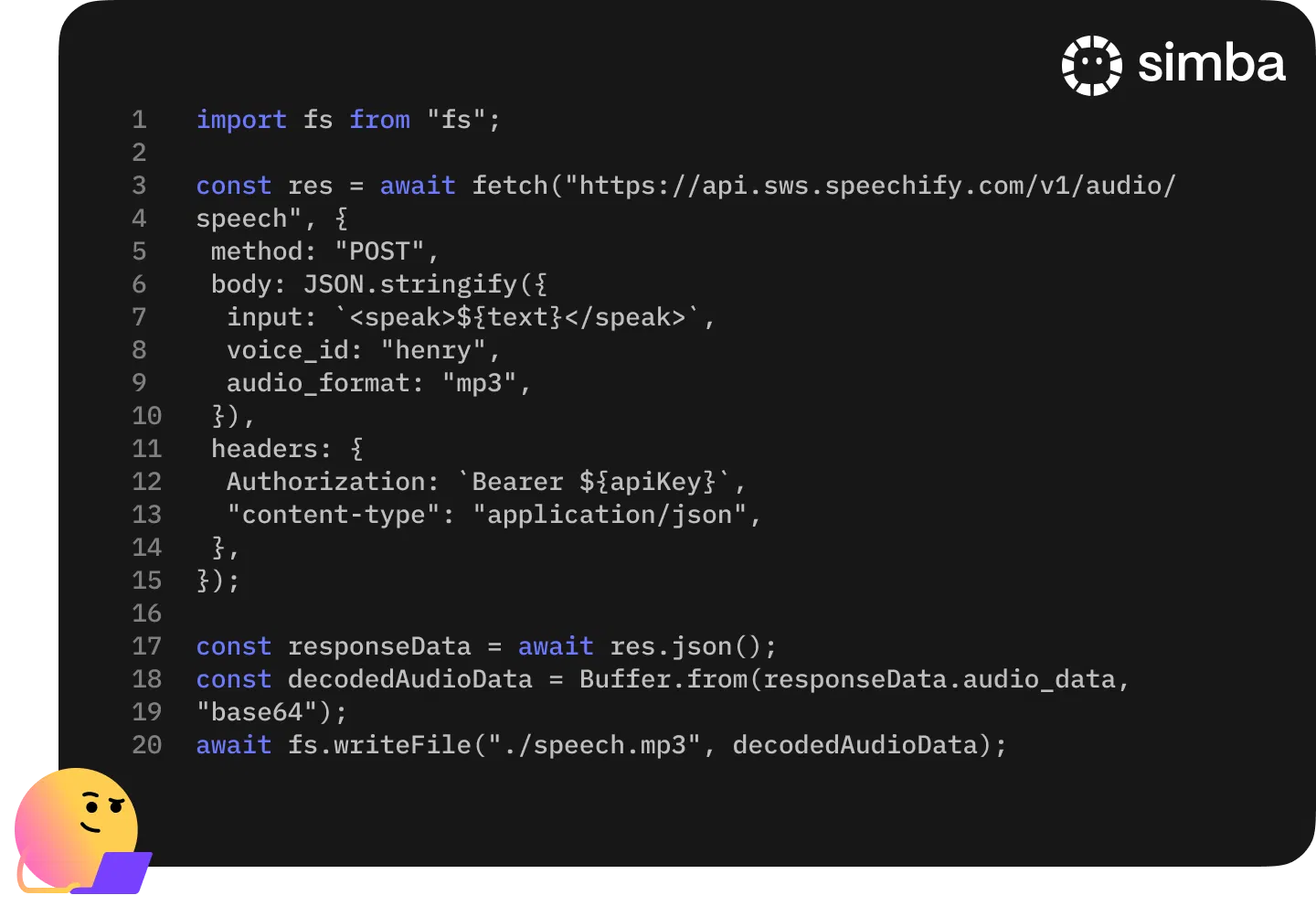
Consider creating a custom AI voice agent to elevate your customer service calls. When deploying such AI solutions, it's crucial to choose the right text to speech (TTS) and voice API for high-quality, natural-sounding voice output. Speechify Text to Speech API stands out as a leading option. Here’s a brief rundown of why it’s the best choice when it comes to AI voice for customer service:
- Natural-Sounding Voices for Customer Service: Speechify Text to Speech API offers over 200 AI voices that are clear, expressive, and lifelike, ideal for enhancing customer service interactions.
- Emotional Diversity in Customer Service: The AI voices from Speechify Text to Speech API include a range of emotional tones such as energetic, warm, calm, and direct, which improve relatability and communication effectiveness in customer service settings.
- Customization Options for Customer Service: Speechify Text to Speech API allows developers to tailor voices by adjusting tone, pitch, and pace, optimizing the auditory experience to meet specific customer service needs.
- Language Support for Global Customer Service: Speechify’s AI voice API supports over 50 languages and dialects, including regional accents like Castilian Spanish and Mexican Spanish, which are perfect for multinational customer service operations.
- Low Latency for Customer Service Applications: Speechify Text to Speech API ensures low latency, critical for providing prompt and efficient voice responses in real-time customer service applications such as virtual customer assistants and interactive voice response systems.
- Custom Voices for Unique Customer Service Identity: Businesses can leverage Speechify Text to Speech API to develop custom or cloned voices, creating a distinctive voice identity for their customer service channels.
Training and Optimization
Regular training and optimization are essential for both AI systems and human agents in managing customer service operations effectively. It's crucial to keep AI models updated with the latest data and trends to adapt to changing customer needs and ensure that human agents are well-equipped to handle transitions and escalations from AI systems.
Training AI models with diverse data sets is vital to ensure they comprehend a variety of accents, dialects, and colloquial terms, which enhances their versatility and effectiveness. Additionally, consistent performance monitoring of the AI voice systems is necessary to fine-tune their accuracy and enhance the quality of interactions, thereby ensuring responses are clear and precise, optimizing the overall customer experience.
AI Voice for Customer Service Platforms
When exploring conversational AI voice agents, another viable option is AI voice agent platforms, which provide pre-configured AI voice agents designed for diverse customer service scenarios. These platforms typically offer less customization than building your own tailored AI agents, but they still bring valuable capabilities to customer service environments. Let's explore their offerings:
Cognigy.AI
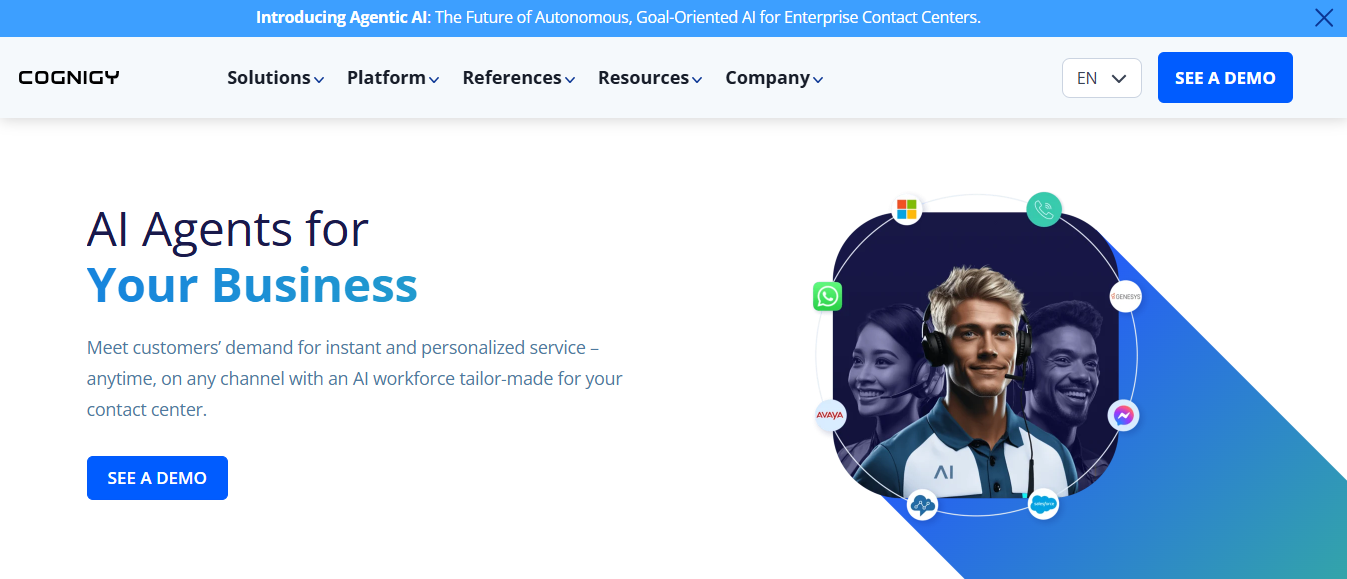
Cognigy.AI enhances call center efficiency by deploying AI-powered voice agents capable of managing over 6 million conversations annually. These agents enrich the customer journey with features that enhance engagement and resolution rates. Equipped with humanlike voices, real-time translation, and emotion detection, they offer personalized and empathetic customer interactions. Cognigy.AI’s technology easily integrates with existing call center setups, streamlining operations and elevating customer experiences.
Synthflow.AI
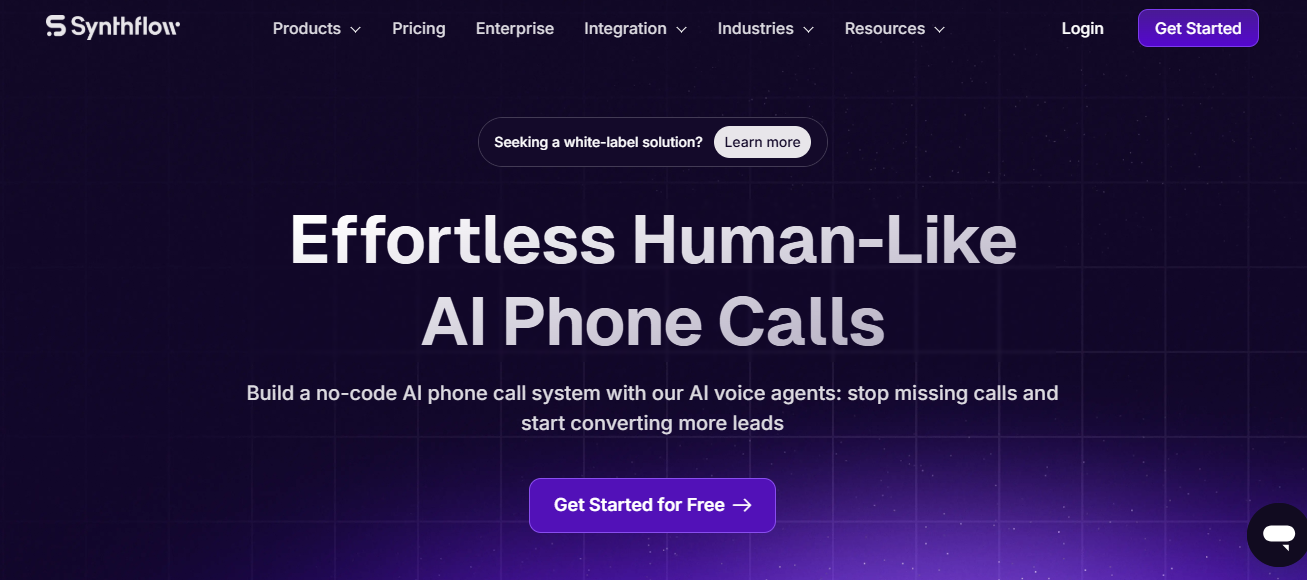
Synthflow.AI streamlines call center operations by automating both incoming and outgoing calls through AI voice technology. This platform, supporting over 20 languages and integrating with more than 200 systems like CRMs and calendars, enhances accessibility and flexibility. It excels in high-volume call management, reducing wait times and improving efficiency. Features like sentiment analysis personalize interactions, while its no-code interface ensures quick deployment and straightforward management, making sophisticated AI tools accessible to businesses of all sizes.
CallDesk
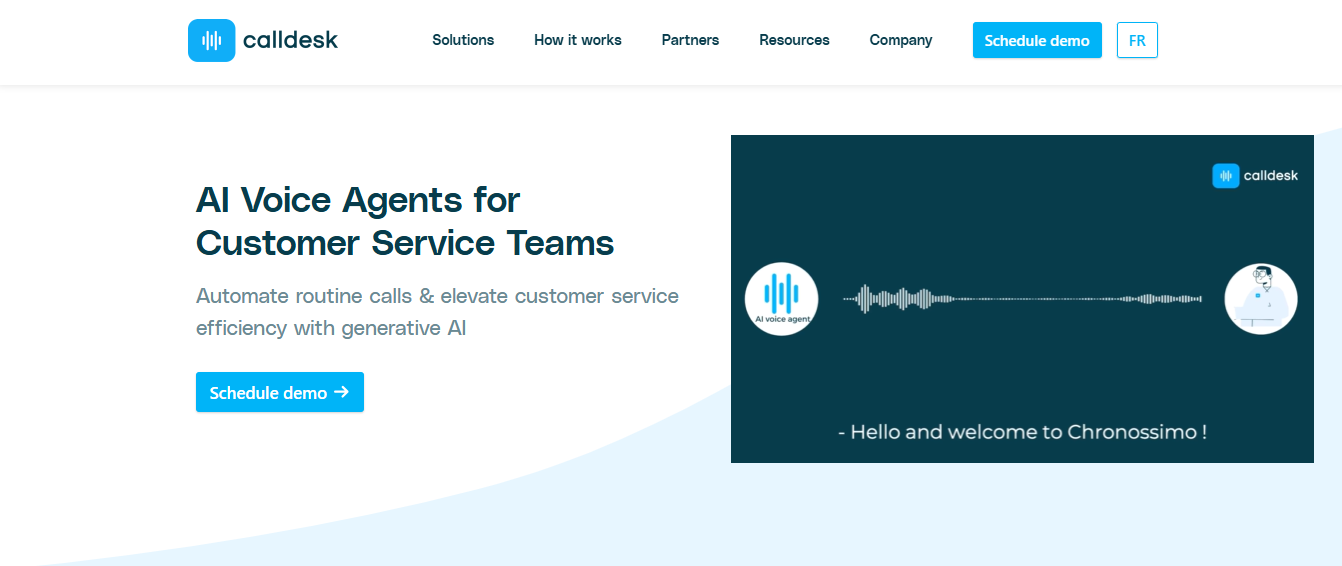
Calldesk leverages AI voice agents to transform call center operations by automating repetitive call tasks, reducing costs, and minimizing handling times. These agents integrate effortlessly with existing infrastructures and can be deployed rapidly, offering 24/7 service and managing peak-hour calls efficiently. Their advanced natural language processing facilitates fluid customer interactions, allowing human agents to tackle more complex issues, thus enhancing overall customer satisfaction.
Voiceflow
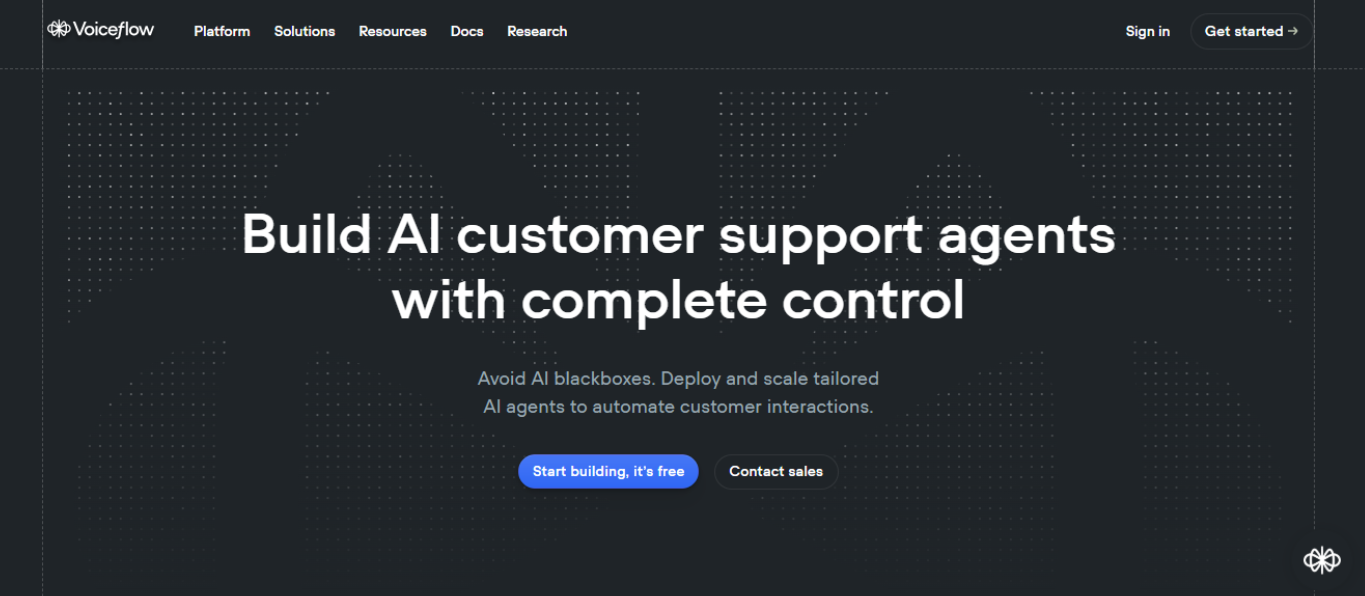
Voiceflow improves call centers by implementing AI to automate routine tasks, tailor interactions, and optimize operations. Their platform allows for effective management of customer engagements with real-time data for customized responses, thus cutting costs and reducing wait times. Voiceflow's scalable AI can also support internal processes, ensuring seamless integration with existing systems for smooth operational transitions.
Tenyx
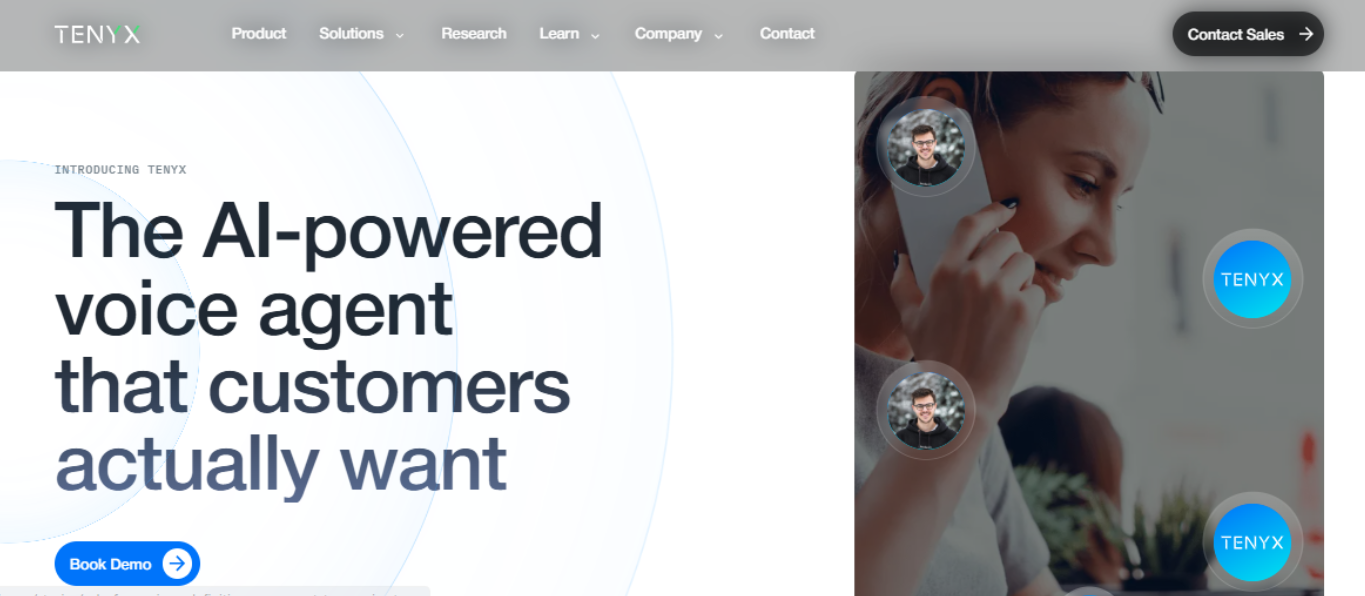
Tenyx employs a cutting-edge AI stack to develop conversational voice agents tailored for enterprises across various industries like e-commerce and healthcare. These agents are based on a strong conversational platform, a versatile AI core, and industry-specific configurations, ensuring efficient operation, dynamic scalability, and smooth integration. Tenyx's comprehensive approach not only improves operational efficiency and customer satisfaction but also enriches customer interactions through personalized experiences.
SmartClose.AI
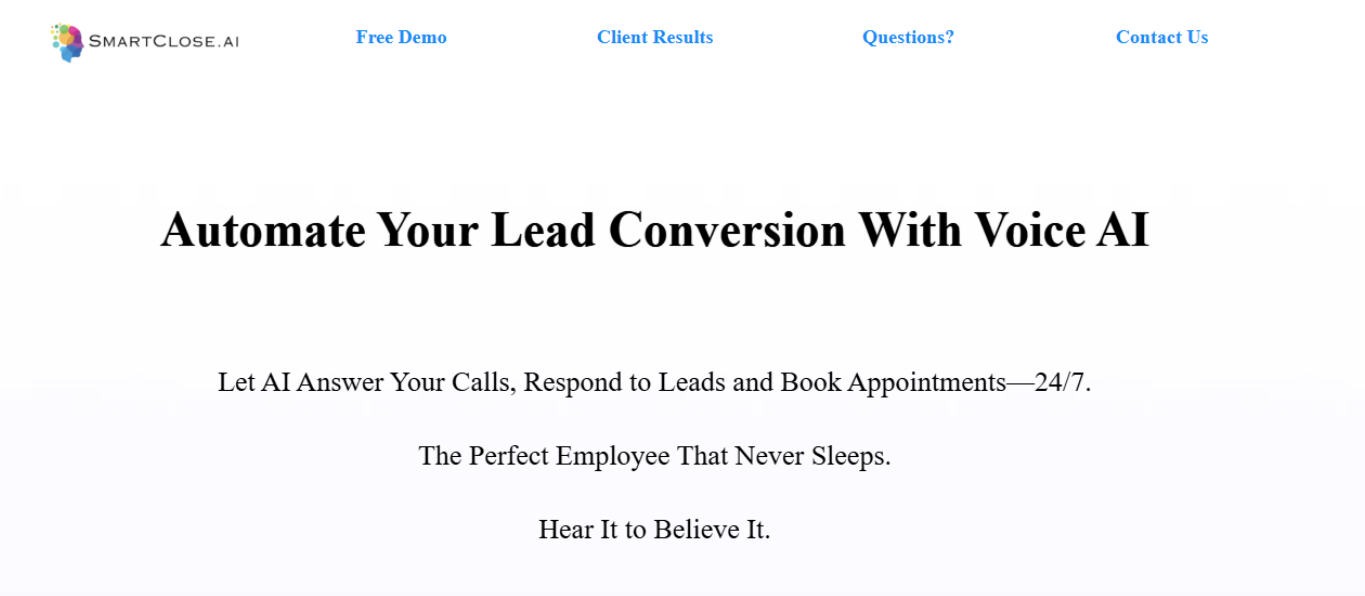
SmartClose.AI uses AI voice agents to enhance service across sectors such as real estate, insurance, and call centers by ensuring responsive communication with every inquiry, even after hours. These agents automate scheduling, manage inquiries, and integrate with CRMs to boost operational efficiency and responsiveness. Offering significant time savings and capturing every lead, SmartClose.AI provides continual service, reducing overhead and ensuring comprehensive customer engagement.
Vapi.ai

Vapi.ai offers a dynamic platform for integrating voice AI into various applications, improving user interactions through comprehensive development tools. Supporting low-latency and multilingual capabilities, it caters to a wide range of businesses from startups to large corporations. Vapi.ai's flexibility, scalability, and developer-friendly design, complete with extensive documentation and support, make it an essential tool for enhancing customer service and operational efficiency.
Air.ai
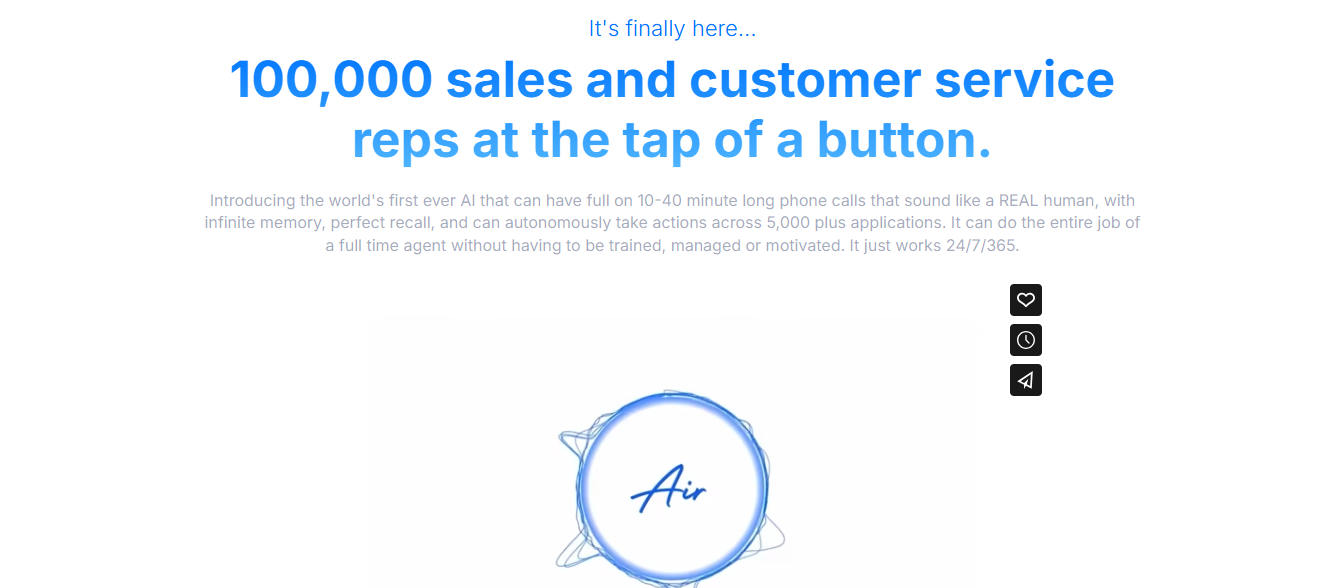
Air AI autonomously manages extended customer service and sales calls, engaging in realistic conversations for up to 40 minutes. It recalls past interactions, spans thousands of applications, and operates 24/7, handling multiple calls simultaneously. Air AI’s human-like dialogue, combined with advanced features like logic trees and CRM integration, enhances operational efficiency and customer experience without the additional costs of expanding human staff.
Bland.ai

Bland AI boosts call center performance with AI-powered voice agents that deliver natural conversations and integrate smoothly with business infrastructures. These agents handle sophisticated language models, offer customizable voice options, and provide smart call management. Quick to deploy and scalable, Bland AI is ideal for enterprises aiming to automate routine calls, engage leads consistently, and lighten human agents’ workloads.
Retell
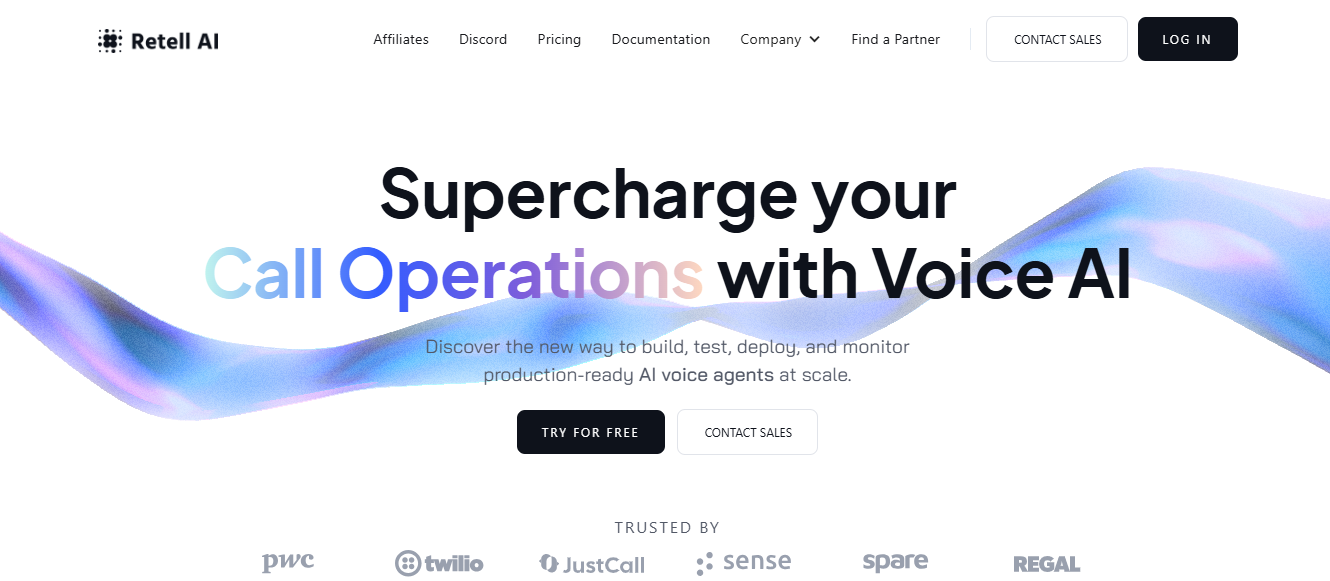
Retell AI empowers businesses to create human-like voice agents that improve customer interactions across sectors. Utilizing advanced language models, Retell AI delivers responsive, natural-sounding communications suitable for a variety of services. With features that support rapid development, seamless integration, and multilingual capabilities, it accommodates diverse business needs. The platform's architecture handles high call volumes securely, enhancing operational efficiency, customer satisfaction, and cost-effectiveness through automated interactions.
Conclusion
Adopting AI voice technology in call centers is not just about keeping up with trends—it’s about taking proactive steps to enhance customer service, reduce operational costs, and improve efficiency.
While pre-configured AI voice agent platforms provide ready-made solutions for various scenarios, building custom AI solutions with platforms like Speechify Text to Speech API offers unique advantages. These custom solutions enable greater control over voice quality, emotional range, and linguistic diversity, ensuring interactions are natural and engaging, tailored specifically to meet business needs and customer demographics.
FAQ
What is the AI voice agent for call centers?
An AI voice agent for call centers is an automated system that uses artificial intelligence to handle customer inquiries, manage calls, and provide support without human intervention, improving efficiency and customer satisfaction.
Can you use AI for customer service?
Yes, AI can be used for customer service. In fact, Speechify's Text to Speech API is ideal for building custom AI agents, offering natural-sounding voices and multilingual support to enhance the customer interaction experience in various service-oriented applications.
What is TTS in IVR?
In interactive voice response (IVR) systems, TTS (text to speech) refers to the technology that converts written text into spoken voice output, allowing automated systems to communicate with users through audible speech.
Is Speechify Customer Service Voice Generator different from your Text to Speech Reader?
Yes, the Speechify Customer Service Voice Generator is different from a typical Text to Speech Reader as it is specifically tailored for creating natural, customer service-oriented dialogues, while a Text to Speech Reader is generally designed for a broader range of text-to-voice applications without specific customer interaction features.
What is conversational AI?
Conversational AI refers to technologies like chatbots and virtual assistants that use natural language processing to understand and engage in human-like dialogue, automating interactions between humans and machines.
How does AI voice technology improve customer service experiences?
AI voice technology enhances customer service by providing 24/7 support, quick responses to inquiries, personalization of interactions based on user history, and the ability to handle large volumes of requests simultaneously, increasing overall efficiency and customer satisfaction.
What are the key features of AI voice assistants?
Key features of AI voice assistants include speech recognition, natural language understanding, machine learning capabilities that allow them to adapt and learn from interactions, multi-language support, and integration with various software ecosystems to perform tasks such as setting reminders, answering questions, and managing devices.

